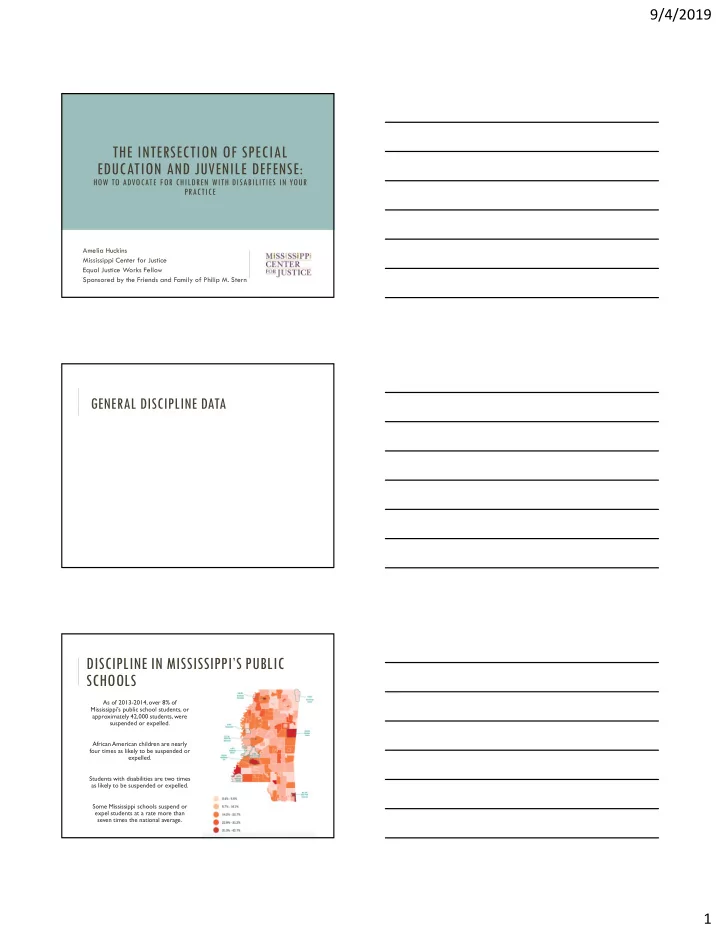

9/4/2019 THE INTERSECTION OF SPECIAL EDUCATION AND JUVENILE DEFENSE: HOW TO ADVOCATE FOR CHILDREN WITH DISABILITIES IN YOUR PRACTICE Amelia Huckins Mississippi Center for Justice Equal Justice Works Fellow Sponsored by the Friends and Family of Philip M. Stern GENERAL DISCIPLINE DATA DISCIPLINE IN MISSISSIPPI’S PUBLIC SCHOOLS As of 2013-2014, over 8% of Mississippi's public school students, or approximately 42,000 students, were suspended or expelled. African American children are nearly four times as likely to be suspended or expelled. Students with disabilities are two times as likely to be suspended or expelled. Some Mississippi schools suspend or expel students at a rate more than seven times the national average. 1
9/4/2019 WHAT ARE STUDENTS SUSPENDED AND EXPELLED FOR? Objective Offenses: smoking, vandalism, leaving school campus without permission, obscene language. Subjective Offenses: insubordination, willful defiance, disrespect, excessive noise, threats, loitering. LEGAL PROTECTIONS FOR STUDENTS MISSISSIPPI LAW Habitually Disruptive Students Statute (Mississippi Code § 37-11-18.1): students who are habitually disruptive must have a behavior modification plan based using positive behavior interventions implemented before that student can be expelled. Code of Conduct (Mississippi Code § 37-11-55): all schools must adopt a code of conduct outlining disciplinary procedures, how to create a behavior modification plans, etc. Automatic Expulsion Statute (Mississippi Code § 37-11-18): automatic expulsion if a child brings a controlled substance, knife, gun, or “any other instrument considered to be dangerous and capable of causing bodily harm” or commits a violent act on school property. Due Process When a Student is Suspended for 10 or More Days or Expelled (Mississippi Code § 37-9-71): the student is entitled to a hearing, to be represented by an attorney at that hearing, to present evidence/cross examine witnesses at that hearing, appeal the hearing's decision to the school board, and appeal the school board's decision to court. Bullying Statute (Mississippi Code § 37-11-69; see also Mississippi Code § 37-11-67): allows victims of bullying to defend themselves; requires schools to adopt anti-bullying procedures. 2
9/4/2019 FEDERAL LAW • Protections come from: • The Individuals with Disabilities Education Act (IDEA) (20 U.S.C. § 1400 et seq .) • Title II of the Americans with Disabilities Act of 1990 (42 U.S.C. § 12101 et seq .) Section 504 of the Rehabilitation Act of 1973 (29 U.S.C. • § 701). • Title VI of the Civil Rights Act of 1964 (42 U.S.C. § 2000d et seq .) • Title IX of the Education Amendments Act of 1972 (20 U.S.C. § 1681 et seq .) THE IDEA FREE APPROPRIATE PUBLIC EDUCATION (FAPE) • The purpose of the IDEA is “to ensure that all children with disabilities have available to them a free appropriate public education that emphasizes special education and related services designed to meet their unique needs and prepare them for further education, employment, and independent living.” 20 U.S.C. § 1400 (d)(1)(A). • All students with disabilities are guaranteed a FAPE— even if they exhibit behavioral difficulties in the classroom and/or get referred to youth court. 3
9/4/2019 CHILD FIND • All schools have an affirmative duty to identify, locate, and evaluate all children with disabilities that either have, or are suspected of having , disabilities and need special education as a result of those disabilities. 20 U.S.C. § 1412(a)(3); 34 C.F.R. § 300.111. • Parents do not have to request a special education evaluation in order to trigger Child Find. Robertson County School System v. King , No. 95-5526, 1996 U.S. App. LEXIS 27257, at *12 (6th Cir. Oct. 15, 1996). INDIVIDUALIZED EDUCATION PROGRAMS (IEPS) • Once a child is determined to be a child with a disability under the IDEA, an individualized education program (IEP) is created to outline: • The child’s diagnosis/diagnoses • Unique talents and challenges • Annual goals • Accommodations/modifications, etc. • A committee comprised of general education teachers, special education staff, specialists, parents, etc. comes together to determine the IEP each year. • Can be amended as needed to meet child’s needs. • 20 U.S.C. § 1414(d) governs IEPs. MANIFESTATION DETERMINATION REVIEW (MDRS) • 34 C.F.R. § 300.530(e) and (f) stipulates that if a child with a disability under the IDEA gets suspended for more than 10 school days or expelled, the school must hold a manifestation determination review (MDR). • At the MDR, a committee must determine if the behavior that the child is being disciplined for is either: • Caused by that child’s disability OR • A result of the school’s failure to implement the IEP. • If the answer to either one of those questions is “yes,” then the student must be reinstated in school. The school must then conduct a functional behavior assessment (FBA) or, if an FBA has already been conducted, amend the child’s behavior intervention plan (BIP) and/or IEP to better meet the child’s needs. • Note: the exception to this rule is if the child gets suspended/expelled for bringing a weapon to school, drug possession, inflicts serious bodily harm on another, etc. 4
9/4/2019 HOW TO IDENTIFY A DISABILITY DISABILITY IDENTIFICATION • Medical/psychological diagnoses. • Repeated patterns of misbehavior (request cumulative discipline files from school district; look for patterns of defiance, disrespect, disruption, etc.). • Incidences of impulsivity. • Effects of medication. EXAMPLES 5
9/4/2019 THANK YOU!! AMELIA HUCKINS MISSISSIPPI CENTER FOR JUSTICE AHUCKINS@MSCENTERFORJUSTICE.ORG (228) 435-7284 EXT. 204 6
Recommend
More recommend